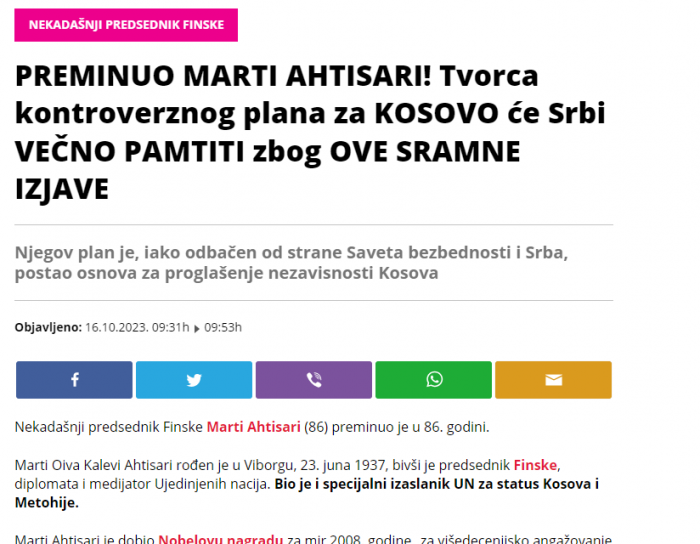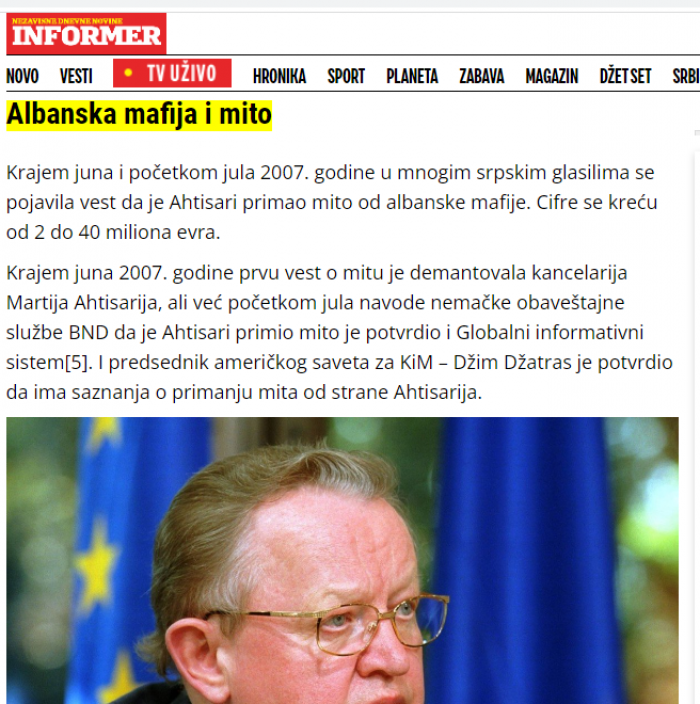Prepared by: Ridona Berisha
Serbian media that are known for their narratives against the state of Kosovo have returned to spreading falsehoods about individuals who were part of the process in the establishment of the Kosovo state. They have done this even in the case of the death of the former President of Finland, Martti Ahtisaari, who is considered the architect of Kosovo’s independence. Ahtisaari passed away on October 16th at the age of 86. Kosovo declared its independence on February 17th, 2008, based on Ahtisaari’s proposal, even though it was not approved by the United Nations Security Council due to the veto rights held by Serbia’s allies, Russia and China, within this organization. Serbia and its allies did not accept Ahtisaari’s proposal, even though it was preceded by lengthy negotiations for the final resolution of Kosovo’s status.
Serbian media closely aligned with the government in Belgrade have once again resorted to their previous claims about Ahtisaari, alleging that he was corrupted by Albanians to establish their state. Consequently, outlets like “Informer” and “Espreso” published articles with titles such as “Who Was Marti Ahtisaari? The Special Envoy for Kosovo, Alleged to Have Taken Bribes from the Albanian Mafia!” and “MARTTI AHTISAARI HAS PASSED AWAY! The Creator of the Controversial Plan for KOSOVO Will Be Forever Remembered by Serbs for This Shameful Statement.” Articles with similar content have also been shared by media outlets such as AdriaPress, Faktor Magazin, Srpskiportal.rs, Alo.rs, Happy Tv, Banjaluka-24, Mondo.rs, Kurir.

Photo excerpted from an article written by Espreso.
In the content of the articles is speculated that Martti Ahtisaari received bribes from the Albanian mafia ranging from 2 to 40 million euros. Initially, these claims were raised in 2007 by some Serbian media but were denied by Martti Ahtisaari’s office. Even in the current reports, these media outlets do not bring anything new, they have only recycled unconfirmed allegations lacking credible references. “The first news about bribes in late June 2007 was refuted by Martti Ahtisaari’s office, but by early July, the German intelligence service BND’s news that Ahtisaari received bribes was confirmed by the Global Information System[5]. The Chairman of the American Council for K&M, Jim Jatras, also confirmed having information that Ahtisaari received bribes,” is stated in one of these articles.

Photo excerpted from the article written by the Informer
Such reports gained traction during the period when the UN Special Envoy for Kosovo, Martti Ahtisaari, submitted his proposal in Pristina and Belgrade on February 2, 2007, which envisaged supervised independence for Kosovo, to be overseen by the International Civilian Office (ICO) until 2012.
Serbia refused to accept the plan even after the United Nations sent a fact-finding mission to Kosovo to assess the circumstances for implementing the plan. Meanwhile, negotiations conducted in Prishtina and Belgrade, mediated by the international “Troika” composed of diplomats Frank Wisner (USA), Wolfgang Ischinger (Germany), and Aleksandr Botsan-Kharçenko (Russia), proved unsuccessful. After several rounds of negotiations in Vienna, Austria, Martti Ahtisaari ultimately presented the proposal for the resolution of Kosovo’s final status.
Since Ahtisaari’s Plan was not approved by the UN Security Council, Kosovo declared its independence on February 17, 2008, and integrated it into its own constitution. Through Ahtisaari’s Plan, Kosovo is defined as a multi-ethnic state, offering various rights to minority communities, especially the Serbian one. Despite the credibility of the Ahtisaari package being questioned through narratives in some Serbian media, suggesting corruption at its core, Serbs have utilized the rights granted by this document, such as the guaranteed seats in the Kosovo Assembly. Furthermore, any amendment to the highest legal act or laws of vital interest requires the approval of two-thirds (2/3) of all deputies holding reserved or guaranteed seats for the representatives of non-majority communities in Kosovo. New Serbian municipalities have also been established based on Ahtisaari’s proposal.
Although over 15 years have passed since the declaration of independence, Serbia continues its efforts to contest Kosovo, either by instrumentalizing the Kosovo Serbs or by lobbying on the international stage. Serbia had sought an advisory opinion from the International Court of Justice (ICJ) regarding whether “the Unilateral Declaration of Independence, made by the self-governing institutions of Kosovo, is in accordance with international law?”. However, after hearing the arguments of Serbia and Kosovo, the ICJ concluded that “the Declaration of Independence does not violate general international law.”
This is not the first instance when Serbian media launch smear campaigns against individuals or international organizations. They have similarly done so during the anniversaries commemorating NATO’s intervention in Kosovo.
*This article is published as part of the Western Balkans Regional Initiative against disinformation. Western Balkans Anti-Disinformation Hub: exposing malign influences through watchdog journalism.



